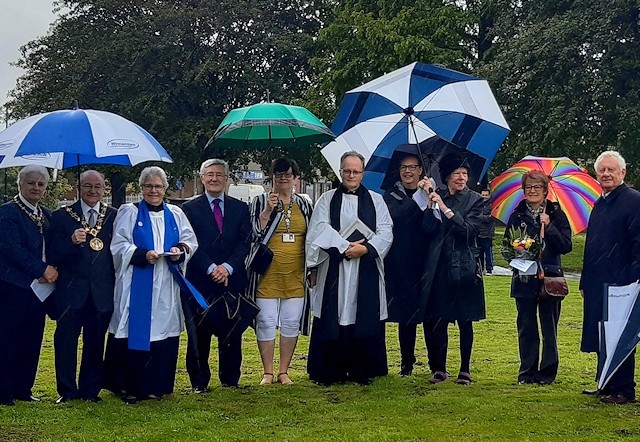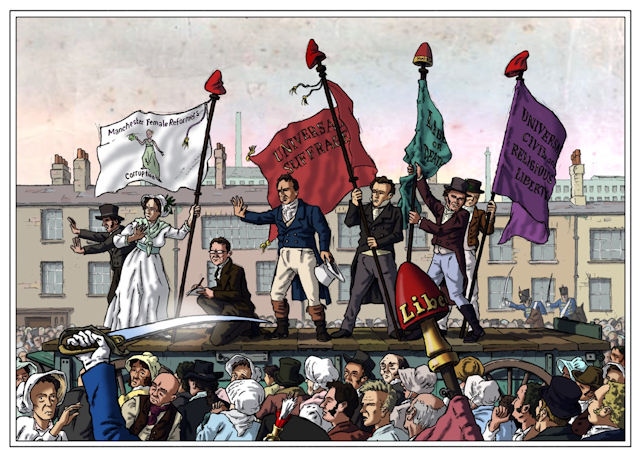Remembering two Rochdale parish Peterloo victims
Date published: 21 August 2019

The gathering at St Chad's remembering two Rochdale victims of Peterloo
The Mayor of Rochdale and others gathered with the vicar of Rochdale, Mark Coleman, on Friday 16 August to remember Abel Ashworth and William Kershaw, both of Rochdale, who were injured at the Peterloo Massacre 200 years ago.
Liz McIvor, Trust Manager at Co-operative Heritage Trust, gave a short talk, Councillor Wendy Cocks read from the Bible and Revd Mark Coleman gave a short address.
Mayor Billy Sheerin laid a simple bunch of flowers in the graveyard. Both Ashworth and Kershaw are buried at St Chad’s, although the exact location of their graves are not known.
Revd Coleman said: “Our common humanity moves us to remember all those who were killed or injured. We remember particularly those two from this parish, Abel and William, who were injured, and we know are buried in St Chad’s graveyard. But we cannot stop there, so we remember all others from the communities that now make up the Rochdale Metropolitan Borough, and from the other parts of the region.
“The Peterloo events raise sobering questions for the church. Many protesters same from non-conformist backgrounds, such as Methodists. The ideas they embraced were encountered in Sunday schools. We do not know the church allegiance of Abel and William; we only know they lived here at Church Stile and Lower Place.
“The idea of human rights has deep roots in the Christian tradition – the writings gathered in the Bible often cry out for justice for the poor and speak of a God who cares for those who suffer exploitation, yet the Church, perhaps especially the Church of England has often been silent.
“We are not ourselves responsible for the attitudes that made it natural for the magistrates to give the order. However, we do well to look at today through the eyes of the victims of Peterloo. Where do we neglect the cry of those who are poor, who seek to be heard today?
“Along with our readings and prayers we commit ourselves to learn from the past so that we can care for all humankind, made in the image of God, and with the wider insights given to us by science, care for the creation which sustains all life.”

Led by Samuel Bamford on 16 August 1819, 60,000 workers and reformers from north west towns and villages including Heywood, Rochdale and Middleton, travelled to hear political speeches at St. Peter’s Field.
The day became known as the Peterloo Massacre after 18 protestors were killed and nearly 700 injured after soldiers and special constables attacked the public protest calling for democratic representation.
Within days the slaughter was named ‘Peter-loo’, an ironic reference to the battleground of Waterloo, and is now considered a defining moment in Manchester’s radical history.
The Manchester Patriotic Union organised the demonstration to be addressed by well-known radical orator Henry Hunt. Alongside Hunt on the speakers' stand were John Knight, a cotton manufacturer and reformer, Joseph Johnson, the organiser of the meeting and others.
One of the ten magistrates on duty at St. Peter's Field on 16 August 1819 was Reverend William Hay, a Church of England clergyman, who later became vicar of Rochdale.
He agreed with William Hulton (chairman of the magistrates) and the rest of the magistrates that Henry Hunt, John Knight and Joseph Johnson should be arrested.
Hay and the other magistrates ordered the cavalry to charge into the peaceful protest to arrest the speakers, presenting the crowd as “potentially violent” to justify the cavalry’s actions.
After the Peterloo Massacre, Hay was given the task of writing the report for the government on what had happened. Two days later, Hay went to London to give a first-hand account to Lord Sidmouth, the Home Secretary in the Earl of Liverpool's government.
In January 1820, the Government appointed Hay to be Vicar of Rochdale, which was one of the richest livings in England.
The stipend of £1,830 equates to over £180,000 per annum today. Despite his considerable income, he continued to live in Ackworth and rarely visited Rochdale.
Do you have a story for us?
Let us know by emailing news@rochdaleonline.co.uk
All contact will be treated in confidence.
Most Viewed News Stories
- 1Newhey's Char Steakhouse and Bank Chamber close with immediate effect
- 2Two men arrested after police chase ends up in Middleton river
- 3Six men arrested in Rochdale child exploitation investigation
- 4Man charged in connection with assault on Christmas Eve in Sudden
- 5Six men charged in connection with child exploitation investigation
To contact the Rochdale Online news desk, email news@rochdaleonline.co.uk or visit our news submission page.
To get the latest news on your desktop or mobile, follow Rochdale Online on Twitter and Facebook.


